#the jetty bbc
Text


Jenna Coleman standing in front of giant posters of herself!
64 notes
·
View notes
Text

new | first look at jenna coleman as detective ember manning in the new bbc crime show "the jetty" 🔥
source: hollywood reporter (full article here: https://www.hollywoodreporter.com/tv/tv-news/the-jetty-first-look-jenna-coleman-bbc-1235789414/?fbclid=PAAaaUNHJzWGGkj4FaB8zkF1aD6MWd80QmgoggcJ5ysz-osqp183h7784gT9E)
[pic edited by me using filetersalee filter on polarr]
0 notes
Text
First look: Jenna Coleman in The Jetty
The BBC has released the first look at Jenna Coleman in upcoming thriller, The Jetty.
Continue reading Untitled

View On WordPress
0 notes
Text
An update on production of Jenna Coleman's upcoming series, The Jetty!
8 notes
·
View notes
Text
Once again, I'm absolutely staggered by all the possiblities of seaweed if handled correctly
For World Ocean Day, Gaia Vince finds out how the planet’s seas could help us to generate clean power, capture CO2 and feed the world. Gaia is joined in the studio by science journalist and marine biologist Olive Heffernan. She dives into the controversy regarding the potential of mining in deep oceans and discusses whether the seas could become the location for Industrial Revolution 2.0.
We’re used to seeing seaweed wrapped around our sushi rolls but it’s so much more than that. As well as being a tasty addition to what we eat, seaweed plays a vital role in absorbing CO2. Gaia speaks to Vincent Doumeizel, a senior adviser on oceans to the UN Global Compact; he’s also the food programme director at the UK-based charity Lloyd’s Register Foundation. He’s confident that seaweed could enable us to sustainably feed a growing global population in the coming decades.
Phytoplankton – microscopic species of algae that exist on the surface of the sea – also absorb huge amounts of carbon from the atmosphere. Sir David King, founder and chair of the Climate Crisis Advisory Group and former chief scientific adviser to the UK Government has the radical idea that artificial whale poo could boost phytoplankton growth, leading to an increase in fish stocks and, consequently, improved biodiversity in the oceans. He tells Gaia about his project and the potential it has for carbon capture.
When we think of energy generation from the oceans, we tend to think of offshore technology such as wind turbines. But what about generating electricity using the water itself? Gaia speaks to Eco Wave Power’s Inna Braverman who reveals how her project harnesses the power of the waves by attaching to existing coastal structures such as piers and jetties, to provide a source of clean, renewable energy.
#wish i had a transcript#may cull some of the statistics later#but using just 2% of the ocean we could grow enough seaweed to eliminate the demand for all the protein being raised in land#functionally it probably wouldn't end up that way#but theoretically that's amazing right?#on land*#oceans#environment#science
14 notes
·
View notes
Photo

Antiques Roadshow comes to Windermere Jetty BBC’s Antiques Roadshow will visit Windermere Jetty on Tuesday 9 June. The museum is one of eight venues nationwide chosen to host Fiona Bruce and her team of experts this summer. Full story: https://www.cumbriacrack.com/2020/02/26/antiques-roadshow-comes-to-windermere-jetty/
0 notes
Photo
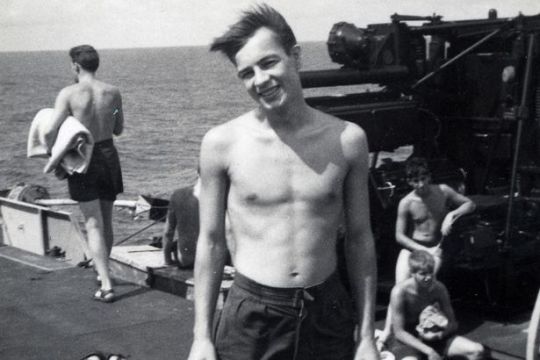


Happy 73rd Birthday Scottish entrepreneur, philanthropist and author Duncan Bannatyne.
Born in 1949 in tClydebank, Duncan says in his own words that he was raised in relatively modest circumstances. He was told by my mother that she could not afford to buy him a bicycle, so he asked the local newsagents if he could start a paper round; when told he would need a list of 100 potential customers, Duncan knocked on many doors and eventually drew up a list of 100 names and addresses, he got the job, bought a bike and never looked back.
As a child Duncan lived in one room with his parents and siblings in a large house shared with six other families. He attended Dalmuir Primary School where he displayed a talent for arithmetic and won a place at Clydebank High School after passing the Eleven plus exam.
In 1964, at the age of 15, he volunteered for 12 years with the Royal Navy as a junior 2nd class engineering mechanic stoker at RNTE Shotley near Ipswich. He served in the Navy for several years before receiving a dishonourable discharge for threatening to throw an officer off a boat landing jetty in Scotland, although one versions of the story said he actually threw the officer off, he was sentenced to 9 months in the forces prison at Colchester. Duncan also served ten days in Barlinnie for a non payment of a fine he got for a breach of the peace.
In my twenties, Bannatyne moved to Jersey, where he met my first wife, and then to Stockton-on-Tees in the North East. It was there that his business career began, with an ice cream van bought for £450; He soon expanded by buying more vans and eventually sold the business for £28,000, founding a care home business instead. Quality Care Homes was sold for £26 million in 1996 and another business, children's nursery chain Just Learning, for £22 million.
From 2005 until 2015, Duncan was a Dragon on the BBC television series Dragons' Den. During his time on the show he invested in 36 businesses.
Since then Duncan has branched into Health Clubs, with the popular Bannatyne's Health Clubs chain, and also bars, hotels and property. He acquired 26 Health Clubs from Hilton Hotels back in August 2006, which made Bannatyne's the largest independent chain of Health Clubs in the Country
In October 2008, in defiance of the credit crunch, Duncan opened the £12,000,000 Bannatyne Spa Hotel in Hastings and also revamped the spa chain.
Duncan Bannantyne supports many good causes, especially for childrens charities such as Mary's meals He is also heavily involved with Comic Relief and UNICEF, and is a passionate anti-smoking campaigner.
11 notes
·
View notes
Text
The Baramulla Connection.

I was born in Srinagar to a family that hails from Baramulla District. My parents are closely related. My paternal grandfather came to Srinagar in 1955 and since then we've been living here although we do have significant business interests in Baramulla. I don't even know if I should still class myself as someone from the North. My maternal side on the other hand does have business interests in Srinagar with hotels in Raj Bagh, they however chose to remain in Baramulla.
Baramulla from the moment you enter it from the Srinagar border, you get a country vibe. I have driven on many roads across the country, but nothing matches driving your car through that poplar alley in peak summers or autumn. The woodsmoke, the evening breeze. It's truly magical.
I did my lower kindergarten from Srinagar and it was around this time my father was kidnapped by militants for a ransom. That's when my family decided it was better to keep me away from all these happenings and sent me to my maternal grandfather's place. I got admission to St. Joseph School Baramulla, one of the most famous schools in Jammu and Kashmir. I don't exactly remember how I must have felt at that time being away from home, I must admit though looking back at things now it must not have been very very good. However the base for my education was set in Baramulla and I am really grateful that I got to spend my early years in a school where it's very very difficult to get admission otherwise.
The biggest bright spot about those early years was my Naana Ji who I dearly called as ''bade papa'' or simply ''Papa''. He was a businessman who started from the scratch and made a name for himself. It wouldn't be wrong to say that he has contributed more to my perspective on life than my own parents have and I am absolutely proud about it. He would make me listen to BBC on Radio. He would ask me to give a brief of the news I read on Newspapers and it is him who inculcated in me the habit to ask questions about everything. His outlook on life was very very broad.
People go to places like Maldives, Goa, Sri Lanka now still hesitant to take their families. He took his daughter (my mother) to these places in the mid 80's when she just had hit the teenage. I still haven't been to these places still :P But no, this just shows he was way ahead of his time. Way way ahead. Some of my life's greatest memories are with him. Every afternoon, he would put on one of his gowns which he had imported from Europe and take me for a walk to the place in picture above. It is famously called as Jetty around that area. It is just 2 minutes walk from my maternal home. We would sit here at this old platform which had been abandoned and he would explain to me the meaning of life through his experiences and travels. We would throw the pebbles in the river, we would see the kingfisher catching the fish, we could see the sun setting down amidst the sound of the Dove's coo and this more than anything is the greatest memory of my life.

One particular incident that I clearly remember is sometimes he would take me for a longer walk to this canal which would supply water to the nearest rice fields. he would hold my hand while I walked in the middle of the canal which was shallow. I once stepped on a bog while walking in the canal and my slippers got stuck there in the mud. I had to walk barefooted home. I remember going to the same place again after I think 14 years in 2018. The canal had dried up as the rice fields had been converted into Apple orchards which do not require regular irrigation. I decided to dig deep in the canal to look for those lost slippers and I found them. I absolutely found them. I came to Nana Ji's room with those slippers and asked him if he recognised them. He didn't. By this time his memory had become weak as his cancer had relapsed with more aggression but as soon as I reminded him of that day, he smiled and kissed my hands. This is something I will cherish for the rest of my life. Those questions, those briefings, those walks and strolls, those drives to Sheeri where he would make me watch the fishermen catch their fish after having cast their nets for days and then explain to me the difficulties in earning livelihood, this is something that I will never ever forget. Memories made with him will forever be etched in my memory.
I came back to Srinagar in 2005 and got admission in prominent school here. I got educated, I did LL.B from Amity University in Noida. I lost touch with Baramulla in between all this. My grandfather passed away in 2019 August. I met him just two days before he departed us. I could not attend his funeral or see him for last time again as I was in Delhi and this remains a forever regret.
From my paternal side, there's nothing much to remember about my time in Baramulla because we are settled in Srinagar for nearly 70 years now. My paternal origins in Baramulla are very humble. I have heard stories and they are emotional stories. We were the landlords owning and still own lands across the Baramulla Country (kandi as it is called locally) My great-grandfather due to a petty dispute had thrown his first wife (my great grandmother) out of his home with his four children and married again. She used to work on a spinning wheel to make the ends meet and feed her four children, youngest of whom was my grandfather. Seeing the hardships that his mother had to endure, he quit studies by the time he was 10 and then started bringing the firewood from the jungle to sell it in the market. He was then hired as a worker at a local bakery in Srinagar where he learnt the art of baking. Baking is an art for me. His salary in those days was 6 Rupees per month which after managing the expenditures, he would give to his mother. So the story goes that my great grandmother had managed to save 70 Rupees. The access to our village was limited and one either had to take a pony or walk for 14KM to reach there from the last motorable road. This is when my great grandmother spent those 70 rupees to buy a horse for my grandfather just so when he would come home at the end of the month, she would be waiting for her son on the horse at the last motorable road to travel to our village to make sure he does not travel those 14Km on foot. Within no time my grandfather had become a huge success. His buisness was shining. He was purchasing properties left right and centre. His name featured in then Times of India with a news that a man called Qutub Ud Din Khan is so rich in Kashmir that he has purchased a property in Baramulla for 50,000 rupees. But two tragedies happened in quick time which would dampen the excitement. The horse which my great grandmother had bought after saving that money amidst all that struggle she had to endure was nicked in the end and my great grandmother passed away too just a year after my grandfather's marriage and she could never see the good times properly. My great grandfather mistreated my great grandmother and she had penned a very emotional feminist song about the tragedies she faced. I don't exactly remember the verses of it, I'd ask my Amma to tell me about them but I remember hearing it for the first time and my eyes just teared up. I visited my ancestral home in 2015 for the first time in Laridora hamlet of Baramulla district and as I reached the top floor, I saw the spinning wheel which my great grandmother used to spin to make ends meet. I absolutely broke down in tears. Those who had seen my great grandmother remember her as a woman of dignity. One who never gave in. Her fingers were dislocated and disfigured by constantly spinning the wheel. My great grandmother was a feminist even before the term became mainstream. I had gone to my village in a posh SUV with all the comforts of life. It was a very emotional experience thinking about where I actually came from. If I ever feel I am becoming arrogant or things are getting to my head, I remember that spinning wheel and it keeps me grounded.
Ever since I have come back to Kashmir after finishing my LL.B, my connection with Baramulla is getting re-established, albiet this time more on the lines of business. We have two shopping centres under construction there and by the time they are ready, I am sure I'd be spending a lot of time in Baramulla again. I would like to build a hut there on top of the mountain along the creek and feel the vibe like I did with my Nana Ji. Those were the absolute times. For that period between 1998-2005, I'd just like to remember nothing else but the part which I spent with my Nana Ji. He has inspired me.
I am hoping this time my connection with Baramulla doesn't get lost in time. I am soon opening a grocery store there and there's a lot more to come, but before that, I'd like you guys to pray for my health. My spine is back to behaving abnormally again causing me immense agony in my right leg. I may have to go under the knife to get it fixed finally. I am scared but I am also motivated.
Until then, bye bye.
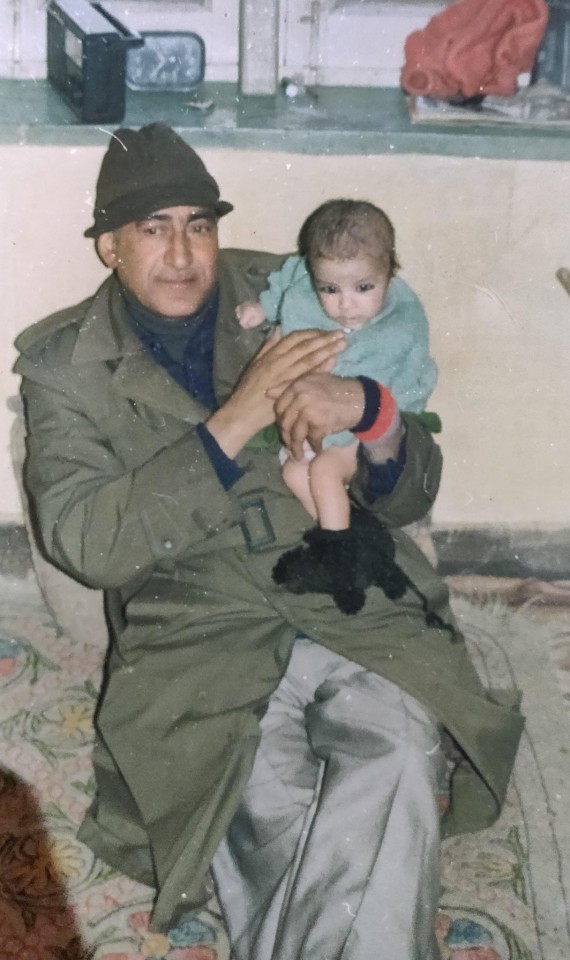
4 notes
·
View notes
Text
Good pill, bad pill
I think it’s interesting to compare BBC Sherlock’s initial episode ”A Study in Pink” (ASiP) with the original ACD story ”A Study in Scarlet” (STUD), to have a closer look into what Mofftiss have chosen to include or exclude, and try to figure out their possible intention with this.
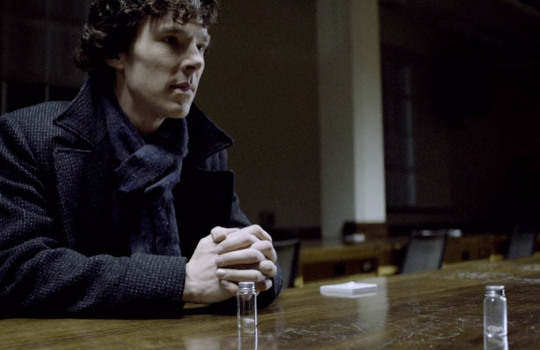
Much of the text below will be based on my own speculation rather than evidence, so I can’t claim to really use Holmes’ methods of deduction here. But I still believe that these initial stories are significant for learning about deductive reasoning, since the creators in both cases take the opportunity to introduce the audience to the famous detective’s methods. And this might be very important if we want to try to decode signals and interpret the meaning of the rest of the stories – both regarding text, subtext and meta level perspective.
So let’s start with a simple comparison between STUD and ASiP:
Similarities
• The story’s name is similar, although the colour reference in it differs slightly (‘scarlet’ vs ‘pink’)
• This is also the story of John Watson’s first encounter with Sherlock Holmes.
• The perpetrator’s name is Jeff(erson) Hope and he works as a cabbie.
• Hope is guilty of more than one murder.
• Hope knows that he will probably die soon, since he suffers from an aneurism.
• Hope literally makes (by coercion) his victims commit suicide.
• Hope offers his victims a 50-50 chance to survive by having them choose between a ‘good pill’ and a ‘bad pill’. The bad pill contains a potent poison that will instantly kill whoever swallows it. The good pill is harmless. Hope will eat the remaining pill.
• The word ‘Rache’ is written at the crime scene.
• Love is shown to be a ‘vicious motivator’ for murder.
• Hope dies before he’s brought to justice.
• Holmes explains his methods in detail to Watson, while obviously also using them to impress him.

(The interesting thing in this TRF scene is not Sherlock’s obvious lie about not having used deduction on John when they first met, but his admission that he was indeed trying to impress John ;) )
Differences
’A Study in Scarlet’ refers to “the scarlet thread of murder running through the colourless skein of life”, as Holmes so poetically puts it, while ’A Study in Pink’ refers to the “frankly alarming shade of pink” (according to Sherlock) that one of the victims uses in clothing and accessories.
While the perpetrator in STUD has a very personal motive for killing two particular individuals, in ASiP he is a serial killer who targets anyone, and he is actually payed (by Moriarty) to kill as many people as possible.
In STUD the readers are presented a long, dramatic and rather sentimental backstory that takes place in Utah, USA, about atrocities committed by the murder victims to innocent people in the past (X).

The fair Lucy Ferrier is kidnapped and forced to marry her kidnapper. Lucy dies out of broken heart and her adoptive father is murdered, while her fiancee Jefferson Hope is left to avenge their tragic deaths. This detailed backstory appears written to make the readers sympathise with Jeff Hope and his mission of revenge. Moriarty has nothing whatsoever to do with it.
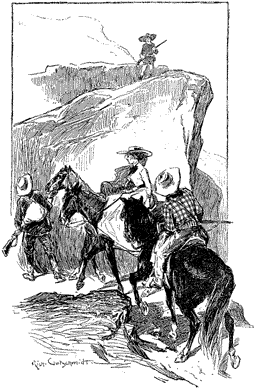
In ASiP, on the other hand, the only back story we get are the short words that Sherlock hears or deduces from Hope: that he murdered anyone (in the Unaired Pilot it’s explained as “anyone who didn’t know where they were going, ’cause they were drunk or lost or new in town”) for money and for the sick satisfaction of having ‘outlived’ them. That his kids, whom he wasn’t allowed to see, would inherit the money didn’t exactly make his motive easier to sympathise with.
In STUD the word ‘Rache’ – written in blood by the perpetrator - turns out to refer to ‘revenge’ in German, illustrating the perpetrator’s motive while at the same time misleading the police to put the blame on organized crime. Lestrade’s men, however, think the writing refers to the name ‘Rachel’.
In ASiP it’s exactly the other way around: Anderson claims ‘Rache’ - written by the victim - is German for ‘revenge’, but it actually refers to the victim’s still-born daughter Rachel and is also a password. And Moriarty – who has a crime network – pays for the murders.
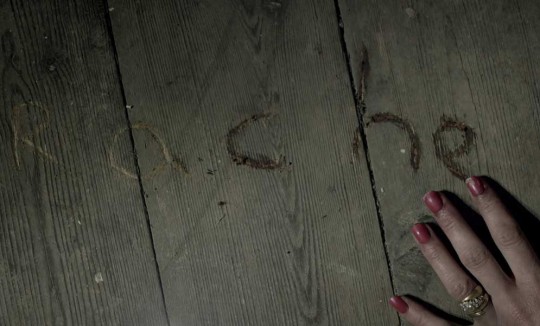
In both cases Holmes gets the police on the right track again by revealing the meaning of the code.
One of Holmes’ most remarkable deductions in STUD is when he proves that there’s a bad pill and a good pill by testing them both on a dog that is already dying. This is the first time the dog theme appears in canon. But this part is excluded from ASiP, and the audience cannot be sure that there really is a good pill, since we never see anyone swallow the good one.
In STUD Jefferson Hope dies from his aneurism before the trial, and seems satisfied with his own end after having reached his goal of revenge; the violence is over. In ASiP, however, Hope is shot by John Watson,

and then Sherlock steps on Hope’s wound to make him reveal information before he dies.
But the most important difference is, I believe, that Sherlock gets personally involved with the case in ASiP - the serial killer starts playing his deathly game with the detective too, trying to make him swallow one of the pills. And Sherlock hooks on, out of sheer curiosity and a death wish an urge to prove his own cleverness in making the right choice. He is mere seconds from a likely, self-inflicted death when John Watson steps in and saves the day with a next-to-impossible shot from his army gun, like a true action hero.
Nothing remotely like this ever happens in STUD, where Holmes seems personally rather detached from the whole case, managing to capture the culprit with a clever manoeuvre right in front of Lestrade and Gregson. One might indeed wonder why Mofftiss chose to distance themselves so much from canon in this case?
More canon in TAB
An interesting alternative version, more similar to STUD, however, is to be found in The Abominable Bride (TAB). In the part of the Victorian version (which takes place inside Sherlock’s head) where Watson’s first meeting with Holmes is depicted, some lines are even taken almost verbatim from STUD, for example:
"...the second Afghan war had broken out”.
“The campaign brought honours and promotion to many, but for me it had nothing but misfortune and disaster”.

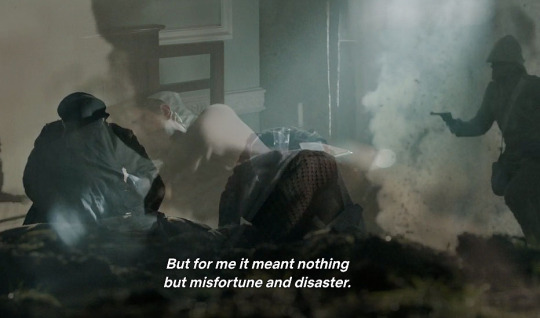
“...and landed a month later on Portsmouth jetty, with my health irretrievably ruined,..”

“Under such circumstances I naturally gravitated to London, that great cesspool into which all the loungers and idlers of the Empire are irresistibly drained”.
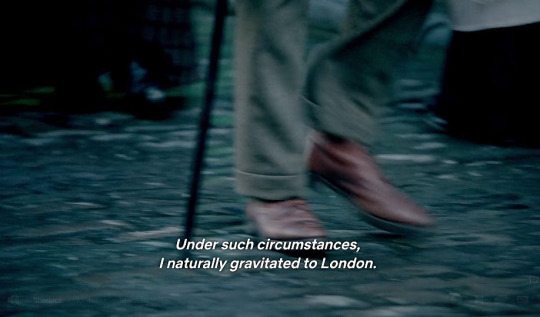
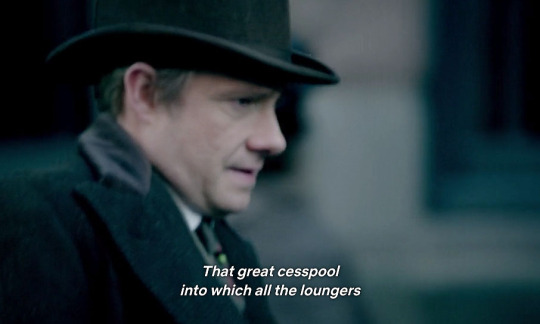

Emilia Ricoletti, who is guilty – or supposed to be guilty in her ghost form – of several murders, also knows that she’s dying (from tuberculosis). Emilia – the ‘abominable bride’ - seems to have a righteous cause and/or some ‘higher purpose’ for what she’s doing, but we’re never actually told the details of it.

She doesn’t choose her victims randomly; it’s all about avenging abuse from the past, connected to events in the US. One of Ghost!Emilia’s victims, Eustace Carmichael, is stabbed to death, just like one of Jeffferson Hope’s victims in STUD. Emilia’s case seems strangely similar to Jeff Hope’s, in my opinion. But the name ‘Emilia’ seems taken from another ACD story; Emilia Lucca in The Red Circle (REDC; X ).

And just like with Emilia Ricoletti, there’s a back story from the US, involving threats of vengeance from a criminal organization. But in REDC it’s Emilia’s husband who kills the abuser, not Emilia herself.
Now, I actually don’t think ACD had a clear, intentional, ulterior motive with his story in STUD (at least not on this stage, having just written his first Holmes story), other than to show a) what an extraordinarily clever man Holmes was, and what a mesmerizing effect he had on Watson, and b) that things aren’t always what they appear to be; love can, for example, work in mysterious ways. This is just my personal view of course, but I don’t see very much of a story arc in canon. The material is so very extensive (60 Holmes stories, of which 4 are novels and the rest short stories) and so variable (the stories quite often take place in other parts of England, in the US, at sea or in other parts of the world), that the author seems to have problems remembering names and making the timeline work. But the main characters are very consistent and recognizable as persons, and they do seem to develop personally as the years pass.
Subconsciously, however, there could be many things going on with ACD, as often happens with brilliant writers. As far as I can see, there are lots of ‘mirrors’ and repetitions of certain themes that seem significant. And there are lots and lots of examples of a queer subtext in canon.
Mofftiss, as opposed to ACD, have a very consistent format on their story. There are three 90 minutes long episodes in each series (TAB and MHR being the exceptions, but they aren’t presented as parts of the regular series) and the idea that the story will end with S5, representing a play in five acts, isn’t exactly taken out of thin air (X).
Deductive reasoning
As for ACD’s description of Holmes’ methods, I think this quote from STUD is particularly interesting (my bolding):
“In solving a problem of this sort, the grand thing is to be able to reason backward. That is a very useful accomplishment, and a very easy one, but people do not practise it much. In the everyday affairs of life it is more useful to reason forward, and so the other comes to be neglected. There are fifty who can reason synthetically for one who can reason analytically.”
“I confess,” said I, “that I do not quite follow you.”
“I hardly expected that you would. Let me see if I can make it clearer. Most people, if you describe a train of events to them, will tell you what the result would be. They can put those events together in their minds, and argue from them that something will come to pass. There are few people, however, who, if you told them a result, would be able to evolve from their own inner consciousness what the steps were which led up to that result. This power is what I mean when I talk of reasoning backward, or analytically.”
So, if we try to apply this method to subtext and symbolism, what might we deduce about the name ‘Hope’ in this context?
Well, it might simply mean that the murderer offers the victims a certain degree of hope by saying that they have a 50-50 chance of survival. Which also can be interpreted as cruel, since he’s playing with their lives. But in STUD we know that this ‘hope’ is real, since Holmes tests both pills (on a dying dog. Hmm...) and finds one of them harmless. And Jefferson Hope says he relied on Providence that his victims (who are murderers) would take the ‘bad’ pill and leave the ‘good’ pill for him: “Instead of grasping at the chance of safety which that offered him, he sprang from his bed and flew at my throat. In self-defence I stabbed him to the heart. It would have been the same in any case, for Providence would never have allowed his guilty hand to pick out anything but the poison”.
Which gives this a slightly religious touch; Hope apparently had faith that God would support him in his vindictive mission. And he died satisfied of having accomplished his mission, very much like Emilia Ricoletti in TAB.
In ASiP, however, we don’t even know if Hope is lying about the ‘good’ pill or not, so this ‘hope’ might be a false one. So why did Mofftiss still choose to keep the name Hope for the cabbie? Later on (in TLD) we learn of another character named Faith, who leaves an emotional imprint on Sherlock, but (allegedly) then disappears into thin air.

In ASiP Sherlock wins Hope; John kills the cabbie and a great opportunity opens for Sherlock; he now has a friend, and he might even be loved. But in TLD, after John has left him and doesn’t seem to want him in his life any more, Sherlock loses Faith (she was an illusion and John attacks Sherlock instead).
Maybe the answer lies in the meaning of ‘the bad pill’ and ‘the good pill’? I’ve said before that I believe BBC’s Sherlock is playing a game of chess with Death. Even if John saves him in ASiP, he is still constantly drawn towards The Game in the rest of the show. In TRF he’s offered a choice between playing Moriarty’s game and staying with John. And he choses to play and leaves John behind (because he believes this will protect John). But Sherlock is very wrong there, isn’t he? In leaving John, he might (metaphorically) have chosen ‘the bad pill’, and to me he certainly seems to be dying in S4. So, my speculation for S5 is that Sherlock will wake up and finally try to correct this mistake, leave his reckless game with Death and choose ‘the good pill’ instead - Johnlock. ;)
Tagging a few people who might be interested: @ebaeschnbliah @sarahthecoat @raggedyblue @gosherlocked @tjlcisthenewsexy @sagestreet @loveismyrevolution
73 notes
·
View notes
Text


Jenna Coleman at the BBC Studio showcase last week!
#jenna coleman#jenna louise coleman#bbc studio showcase#the jetty#ember manning#bbc#the jetty bbc#the jetty tv show#bbc showcase#beautiful#actress
61 notes
·
View notes
Text
New technology from Norway ensures that we don't have to cut down the rainforest for wood

Tropical hardwoods are beautiful and robust, but not very sustainable. Soft wood from conifers, on the other hand, is too soft to use. A Norwegian company has found a way to harden soft wood, allowing us not to touch the rainforest anymore.
A beautiful jetty, bridge or garden furniture set is made of wood. And these are usually made out of tropical hardwood, which can withstand the cruel outside world. It will last for years with a little maintenance.
Soft wood, from trees such as the pine and spruce, is much less resilient. Although it is increasingly used as an alternative building material in buildings (so-called cross laminated timber), outdoor applications of soft wood are not yet very popular because it is so much more maintenance-sensitive.
Mixture from natural materials & treatments
Norwegian company Kenoby[1] has a solution. They take planks of soft wood and dip them in a mixture. In the process, a liquid byproduct of the sugar industry, furfuryl alcohol, is used to treat the wood. Using pressure, vacuum and heat treatment, the liquid transforms to furan resin and is tied together with the cell structure of the wood in order to improve the wood's abilities permanently. So no aggressive chemicals. The result: wood that is 50 percent stronger than before the treatment. And with that it is suddenly suitable as a scaffold or garden. The technology has been described in multiple articles in media such as CNN, BBC, The Economist and Financial Times.[2]
The idea caught the attention of investors. CNBC Business has listed Kebony as one of Europe's 25 most creative companies. Two companies have put 30 million[3] into Kebony. In doing so, the company mainly wants to become better known and attract new customers all over the world. In the first half of 2021, the company achieved sales that were 23 percent higher than the year before, which makes it seem like they have found a gap in the market.
Growing CO2-neutral wood
It is well known that hardwood can be bad for the environment; especially if there is no hallmark on the wood. But it is often also more expensive than softwood, because the deciduous trees from the tropics grow relatively slowly, and time is money. Coniferous trees, on the other hand, grow quite quickly. Moreover, these are relatively easy to grow sustainably. It is even possible to source most of the wood locally from the large forests in Scandinavia. By carefully replanting and protecting, the wood becomes completely circular - and it captures CO2.
Source
MARC SEIJLHOUWER, Nieuwe techniek uit Noorwegen zorgt ervoor dat we het regenwoud niet hoeven te kappen voor hout, in: Change Inc, 04 -11- 2021, Nieuwe techniek uit Noorwegen zorgt ervoor dat we het regenwoud niet hoeven te kappen voor hout | Change Inc.
[1] Kebony is a Norwegian wood producer. The company has its roots in Wood Polymer Technologies (WPT), which was founded in 1996 and changed its name to Kebony in 2007. Kebony has a factory in Skien (Norway) and offices in Oslo (Norway). Company | Kebony
[2] https://en.wikipedia.org/wiki/Kebony
[3] Kebony’s EUR 30 million financing round was led by Jolt Capital and Lightrock, who will join longstanding Kebony shareholders such as Goran, MVP, FPIM, PMV and Investinor, of which the latter two will remain represented on the Board of Directors. The capital injection will expand and accelerate Kebony’s growth initiatives in core markets in Europe and the US. The funding will enable Kebony to further penetrate a EUR 3 billion market, and leverage the underlying megatrends of producing sustainable materials for the residential and non-residential construction industries.
1 note
·
View note
Text
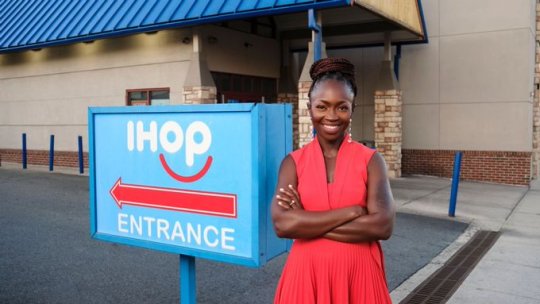
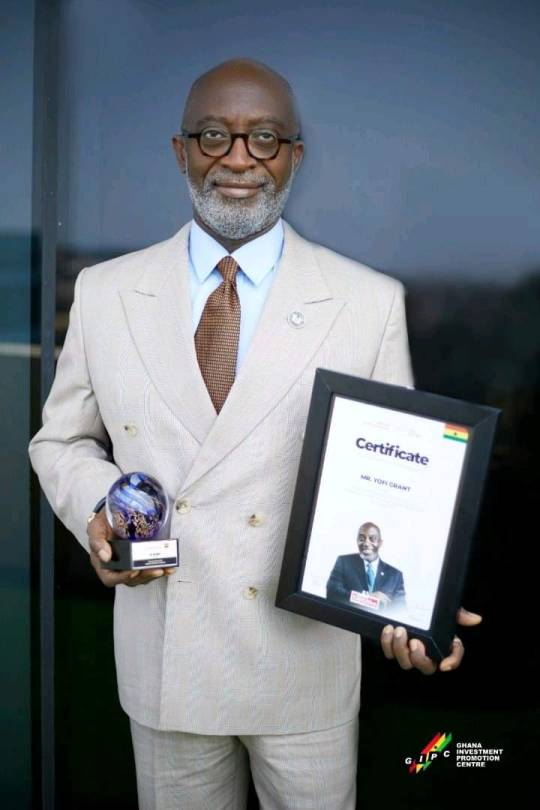
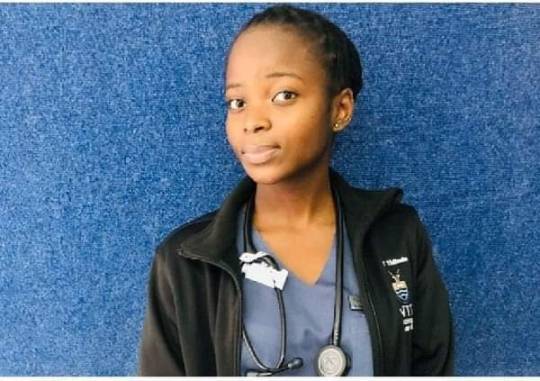

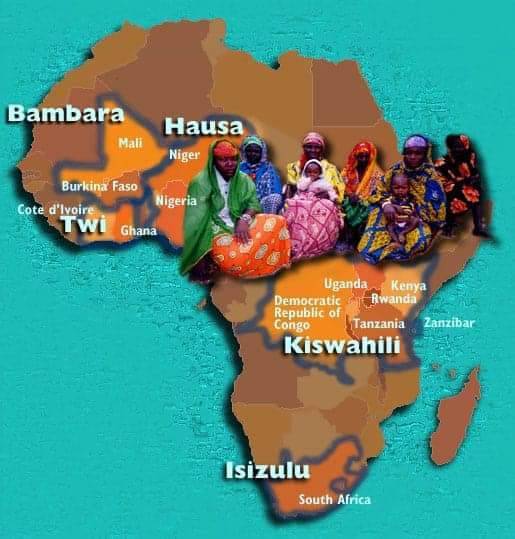
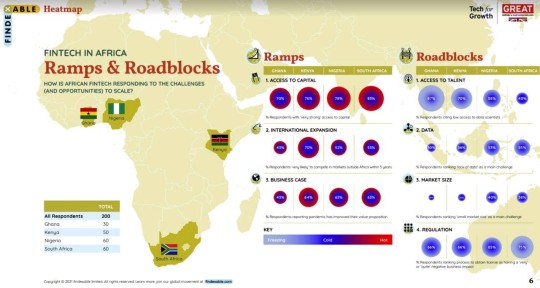


Update On Tekedia Mini-MBA Course On Igbo Apprenticeship System
By Ndubuisi Ekekwe
This is an update on the new Tekedia Institute’s course – “Stakeholder Capitalism: Umunneoma Economics & Igbo Apprenticeship System”. Ohaneze Ndi Igbo is providing support on this course. We expect the course to be completed later in the year. But any Tekedia Mini-MBA member, past, present and future, will have access to it.
The Igbo Apprenticeship System (IAS) component of the course has three core parts:
Igbo worldwide view
Commerce and development
Community and responsibility
We’re making a case that African business frameworks, not just IAS, should be part of our school curriculum. After my BBC World Service interview and the Harvard Business Review article, we are more than excited to continue to push African economic philosophies to the world.
A Nigerian Model for Stakeholder Capitalism
Ndubuisi Ekekwe with Harvard Business Review
For centuries, the Southeastern region of Nigeria has practiced what is known today as stakeholder capitalism — a construct that businesses must elevate the interests of communities, workers, consumers, and the environment alongside those of shareholders. The Igbos, the predominant ethnic group in the region, are known for the Igbo apprenticeship system (IAS), a communal enterprising framework where successful businesses develop others, and over time provide capital and give away their customers to the new businesses. The implication is that few businesses grow to become very dominant, since they keep relinquishing market share, and in doing so, they accomplish one thing: a largely equal community where everyone has opportunities, no matter how small.
As the world explores how to institutionalize stakeholder capitalism — to implement more inclusive, just, and equitable economic systems that work for all, not just a few — we should consider the tenet and the spirit of the Igbo apprenticeship system. The IAS has demonstrated that markets could deepen management accountability, competitiveness, and profitability, while at the same time, anchoring shared prosperity. The result is that communities experience inclusive growth with empowered workers and customers helping firms deliver sustainable fiduciary results. In other words, creating value for all stakeholders — investors, workers, customers, communities, and the environment — is not a zero-sum game; empowered stakeholders empower markets of the future.
The IAS has been recognized as the largest business incubator in the world as thousands of ventures are developed and established yearly through it. Innocent Chukwuma, the founder of Innoson Motors, the largest indigenous automobile manufacturing company by sales in Africa, is a product of IAS. So is Ifeanyi Ubah, the owner of one of the largest private fuel depots in Africa, Capital Oil & Gas, which has the biggest private oil jetty in Nigeria, an 18-ARM loading gantry, ocean-going vessels, a storage facility of over 200 million liters, and hundreds of distribution tankers. Cosmas Maduka, who controls Coscharis Group, a conglomerate with diverse interest in manufacturing, automobiles, and petrochemicals, also passed through the system. Unlike Ubah and Chukwuma, who finished primary education but dropped out at the secondary level, Maduka did not finish primary school. Until recently, that was typical; education has instead been the apprenticeship model, where an individual learns the mechanics of markets and business secrets under a master.
At the core of it, the IAS is a business philosophy of shared prosperity where participants co-opetitively participate to attain economic equilibrium. Accumulated market competitive advantages are constantly weighted and calibrated out, via dilution and surrendering of market share, enabling social resilience and the formation of livable communities. These are engineered by major participants funding their competitors, where success is measured based on support offered to others to thrive, and not by absolute market dominance. For centuries in the Igbo nation, they have kept this culture alive by reminding everyone of a popular saying, “onye aghala nwanne ya,” which means, “none should leave his or her brethren behind,” in the communities and in the markets.
The key focus of IAS is to prevent poverty by mass scaling opportunities for everyone. Igbos believe that when a child is born, he or she belongs to the community. (In fact, Igbos name their children “Nwaoha,” which means “a child of the community.”) Parents bring the children into the world; communities ensure the children succeed and thrive. If anything happens to the parents or they are incapable of raising the child, someone else in the community will step in. Typically, through the apprenticeship system, the child goes through a process of living with a new family, and then over time will transition to working in the master’s business. After a few years, he or she is “settled”; the master willingly relinquishes market share by providing customers, funding to an obvious future competitor, and other things necessary for the mentee to have a thriving venture, with no equity in the new business.
In a very practical sense, you have a scenario where a man, trading in a city, returns to his village, picks three children (usually boys), who might have lost their fathers or the families are too poor to train them, and decides to ensure they have meaningful lives. Those children serve him for some years — a period of apprenticeship — and upon completion, he invites his kinsmen, business partners, and others as he “settles” them. If he was holding a 10% market share in that specific market, by the time he is done, he might be holding only 7%, releasing 3% to the boys. For him, the growth of his company is not what matters; it is that the apprentices do well. But he doesn’t stop there. He sends them business opportunities, making sure they can thrive independently. In some cases, the masters may exit the sector entirely, in order to allow the others to thrive. Ubah, for instance, built a spare parts business in Ghana and Congo, but went back to his native town in Nnewi (Nigeria), brought in young people, and trained them in the business. Over time, he eventually left the sector for them. Chukwuma did the same with his prior manufacturing ventures.
As the world discusses inequalities with the push on stakeholder capitalism, the IAS has handled the equality part for centuries, making the Igbo nation a relative stable community in Nigeria. While Nigeria has average literacy rate of 62%, most states within the IAS record excess of 90%. In addition, the IAS is structured to ensure that everyone has opportunity and support, and by doing that, it prevents extreme poverty and inequalities in communities. The implication is that largely equal communities have improved educational attainment and created stable societies.
Looking at the IAS from a pure shareholder-centric capitalistic mindset, the system may seem defective — until one realizes that the shareholder here is the whole community, and through this model, most Igbo communities have built collective wealth. The Igbos came out of the Biafra war, in 1970, with their assets largely frozen and with little to begin post-war lives. Many Igbo communities started community leagues to build schools and clinics, and elders pushed men to share opportunities to help their brethren. Over decades, that spirit has resulted in enduring economic wealth.
That said, many have noted that the Igbo apprenticeship system could be reformed to provide better protection to the young people who become apprentices to mitigate any abuse from their masters. Having a registry for contracts administered by community elders with municipal power to enforce redress will ensure that contracts on settlements are honored once the young person has served as agreed. But most acknowledge that formalizing the process with written contracts and bringing governments onboard will distort the natural equilibrium where people derive pride that they helped to uplift younger people.
There are many lessons for the world from the IAS system that could elicit new changes in the contemporary capitalist system. IAS improves competition by making it possible to bring new players in a sector, benefiting customers. It brings a new mindset on value creation, going beyond financials to include sustaining communities and families. More so, it creates wealth for everyone. Largely, the Igbo apprenticeship system is a practical demonstration of the ubuntu philosophy — “the belief in a universal bond of sharing that connects all humanity.” It may not be scored high when benchmarked on some Western business and economic frameworks, but for the Igbos and some Africans, it is a working system which has brought equality and peaceful coexistence in communities, making sure that no one leaves his or her brethren behind. Those are the evidential ideals of stakeholder capitalism.
Here is the source link to the article from the Harvard Business Review:ttps://hbr.org/2021/05/a-nigerian-model-for-stakeholder-capitalism
Did you know that data scientists are some of the hottest careers in fintech today? And that they are in short supply in Africa? Did you know that Ghanaian fintechs are 7x more likely to experience data sciences shortage as compared to the South African fintechs? - Augustine Owusu.
Dr. Thakgalo Thibela is the youngest active doctor in South Africa at 21 years of age. She has a bachelor of surgery and bachelor of medicine from Aliver Tambo University.
Nhial Deng
@NhialGD
Three years ago, my friend and high school teacher, @JoeDudim ; a South Sudanese refugee living in Kakuma got into @Harvard with a full ride. I was happy and inspired. And I knew there is a way out.
Daniel Ayuen Jok (Don) @daniel_ayuen #Observation In less than a decade ,Mading Aweil will be an economic power house in the republic . 8/10 hawkers on South Sudanese streets today are from Aweil . That's how Yuan Chinese guys starts their hussle.
Adenah Bayoh, a Liberian Refugee-Turned-Entrepreneur Owns 2 IHOP Restaurants, Her Own Soul Food Restaurant, and a $250 Million Real Estate Portfolio - businesswomen.org
Images: The Liberian entrepreneur, Adenah Bayoh; Ghana CEO of the year; how Awiel town boys of South Sudan hustle on the streets across the nation to make ends meet (traditionally, African men did not do the cooking in public and the same thing can be applied to business, it needs creating new worlds until it is generally accepted by the public); Dr. Thakgalo Thibela, the 21 year old South African doctor; a map showing the expansive reach of Swahili language on the continent, and an African fintech data map.
0 notes
Text
The thumbnail might be a clue as to why I'm posting this link. As the headline says, the BBC First network is going to be added to New Zealand platforms beginning in October 2024, with Jenna Coleman's The Jetty spotlighted as one of the marquee shows.
So a couple of things to unpack here:
First, a possible timeframe for release of The Jetty. Of course it will likely air on the main BBC before, but October 2024 appears to be when NZ fans might expect to see it.
Second, if The Jetty is airing on BBC First, this might well mean that other countries that have their own versions of the BBC First network, such as Canada, may see it there too! I do not know if BBC First exists in the US (BBC America is considered separate from the BBC), but if it does that might be where The Jetty will air (I was speculating PBS at one point). Of course, BBC America does air BBC programming, obviously, so that's also where it may turn up. (At least I hope so; although we do get the occasional DVD/Blu-ray release, if The Jetty ends up on something like Netflix odds are we won't get one in North America, which is what happened with The Serpent that got a UK DVD release because it aired on BBC, but there is not expected to be one in North America because over here it was only on Netflix.
6 notes
·
View notes
Text
0 notes
Photo
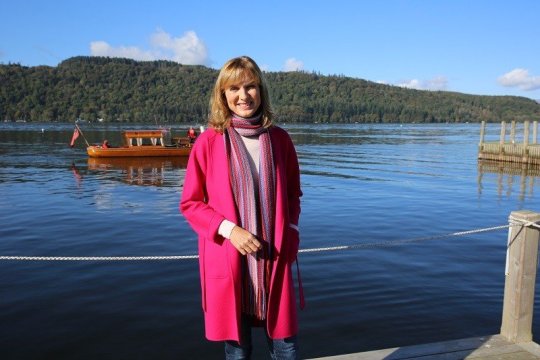
Sunshine and surprises as BBC One’s Antiques Roadshow films at Windermere Jetty Museum Fiona Bruce and the Antiques Roadshow team have been filming at Windermere Jetty Museum, valuing family heirlooms and missing masterpieces. The show which has been running for more than four decades Full story: https://www.cumbriacrack.com/2020/10/01/sunshine-and-surprises-as-bbc-ones-antiques-roadshow-films-at-windermere-jetty-museum/
0 notes